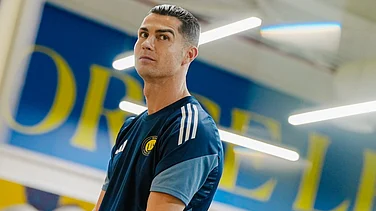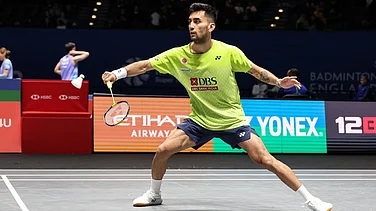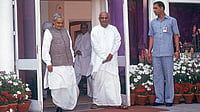''I am not Anju, I'm Manju. My father dropped the 'M' so that I would be first in everything, even in the alphabetical order." If we didn't know her real name, that's nothing compared to the lack of official support Anju Bobby George, India's only world-class athlete, has faced.
Last year, the soft-spoken lady showed just how far you can come from remote Cheeranchira village in Kerala. That was when she became the only Indian ever to win a medal at the biennial athletics World Championship in Paris, when she uncorked a massive 6.7-m leap that got her the bronze in the women's long jump.
Now she is India's best hope for a medal at the Olympic Games in Athens in August. But as she trains at the Sports Authority of India (sai) facility on Bangalore's outskirts, with just her husband and coach Bobby George for company, one thing is clear. The level of support from the government hasn't changed much since her Cheeranchira days.
Anju is confident she will win at Athens, and in a season of loud electoral promises it is no hollow one. The French sports daily, L'Equipe, trailed her recently and made her a yellow Olympic ring—in the Games logo of five circles. The daily had picked the five most promising athletes representing five continents for an Olympic special supplement. Anju got the yellow Asian ring.
But our story isn't about Anju's confidence; it is about the support and cheer she isn't getting. Anju and Bobby keep playing the recording of her Paris jump. She looks lost and lonely. There is not a single Indian in the crowd. Even when she jumps well, she looks unsure, even disappointed. Her quiet frown is in utter contrast with the histrionics and aggression spilling over from the gold medallist, Sierra Leone's Eunice Barber.
Bobby explains that there wasn't a single official felicitation after Paris. "The only consolation was President Abdul Kalam's letter of congratulations. He met us too when we were in Delhi. Otherwise, we were ignored. Even Doordarshan did not cover the event. DD Sports recently showed long jump lessons and the person featured was a British jumper ranked far below Anju in the world," he says.
Adds a weary Anju, "I am a preventive officer with the Customs and after Paris I read newspaper reports that I would get a raise and a promotion. But when the papers for my promotion were put up, they were rejected. God only knows why."
The lack of interest or recognition certainly hurts, especially in a country given to such public adulation of sportsmen—as long as they are cricketers. But in practice, it's financial support that matters most. Training at the international level is expensive. Now take Anju and Bobby, who're still waiting for the sports ministry to reimburse them for their previous foreign training sessions.
Private sector help hasn't been too forthcoming either. "Big sports companies are not interested in us because their turnover is relatively low in India," says Bobby. But the couple recently got lucky, with P.N.C. Menon of the Sobha Construction group sponsoring their campaign towards an Olympic medal. They have also been given a spacious flat close to the sai training centre.
Still, they are restricted to training in India for now. And India's sporting infrastructure is one of the world's poorest. "The other day, the L'Equipe team found a snake in the training area," says Bobby, and reels out an astonishing statistic on synthetic tracks: "Berlin alone has 100, Madrid has 25; all of India has about 18 and most are worn out."
Anju adds a still more damning example: "My run-up is 40-45 metres, but even the Patiala sai, one of India's better sports training centres, has just a 35-metre synthetic track. And there's no trace of the ultra-modern gym we had asked for many years ago". The Bangalore sai centre, where the couple prefer to train while in India, has seen no development in 10 years while nothing has happened at Patiala after the 1982 New Delhi Asian Games.
The Indian sports establishment typically suggests going abroad. "They seldom realise the importance of training at home. The emotional element is so very important in training and winning. When we train abroad, logistics becomes a major problem, food habits alter and you are terribly lonely. When we were training with (long jump world record holder) Mike Powell, we used to travel more than 200 miles a day," explains Bobby.
The bronze-medal performance in Paris nearly didn't happen. The sports ministry dilly-dallied on giving Anju and Bobby a letter saying they were sportspersons, which they needed for a visa. Finally, they had to arrange it through a journalist friend's contacts in the external affairs ministry.
The Indian missions abroad aren't particularly friendly either. "When travelling, they don't even offer you their guest-houses. They recognise only fashion designers and artistes, not sportsmen," Bobby says bitterly.
They say that even the Indian Olympic monitoring committee—bjp leaders Arun Jaitley and V.K. Malhotra are members—hasn't visited sai's Olympic training centre once. Anju and Bobby say their faith in the system is only because of a few individuals, like former Olympian M.P. Ganesh and Indian Athletic Federation president Suresh Kalmadi who have been helpful. But how much can they do if the system is so rigid, they wonder.
"The golden period for Indian athletics was under Rajiv Gandhi; things deteriorated steadily after that. We need someone young and dynamic as sports minister when the government is formed next, not someone like Vikram Verma who was just not bothered."
"Uma Bharati was much better when she held the portfolio, Jayalalitha too promoted women athletes...in fact, the states have done more for athletics than the Centre," says a dispirited Bobby.
Anju knows that government-bashing may be great for letting off steam, but it's useless for her jumping. She's been training hard and working on an optimum diet. Like many other elite athletes, they plan to leave for Greece early, to get used to conditions there. There's also prayer and faith. The devout Anju even visited the Vatican while in Europe last summer. And her kitbag isn't complete without a Mother Mary figurine.
She proudly pulls out a certificate of merit presented to her by the Mor Ignatius Zakka I Iwas, patriarch of Antioch and All the East, the supreme head of the Universal Syrian Orthodox Church. Nearby in the room is a nod to another ancient tradition—a large silver lamp, a gift to her from the seer of the Kanchi Kamakoti Peetam.
P.T. Usha once told her at a function: "In 1984, when I lost the medal by a whisker, the nation cried. I don't want it to happen again in 2004." Anju Bobby George has the faith that it won't.
Bungee Jumping
Anju Bobby George is our lone hope for Greece. Tell that to the sports authorities. Updates
Published At:

Bungee Jumping
Bungee Jumping
- Previous Story
 Cristiano Ronaldo Still In Riyadh, Al-Nassr Statement Confirms Amid Madrid Flight Rumours
Cristiano Ronaldo Still In Riyadh, Al-Nassr Statement Confirms Amid Madrid Flight Rumours - Next Story
WATCH
MORE FROM THE AUTHOR
×

















